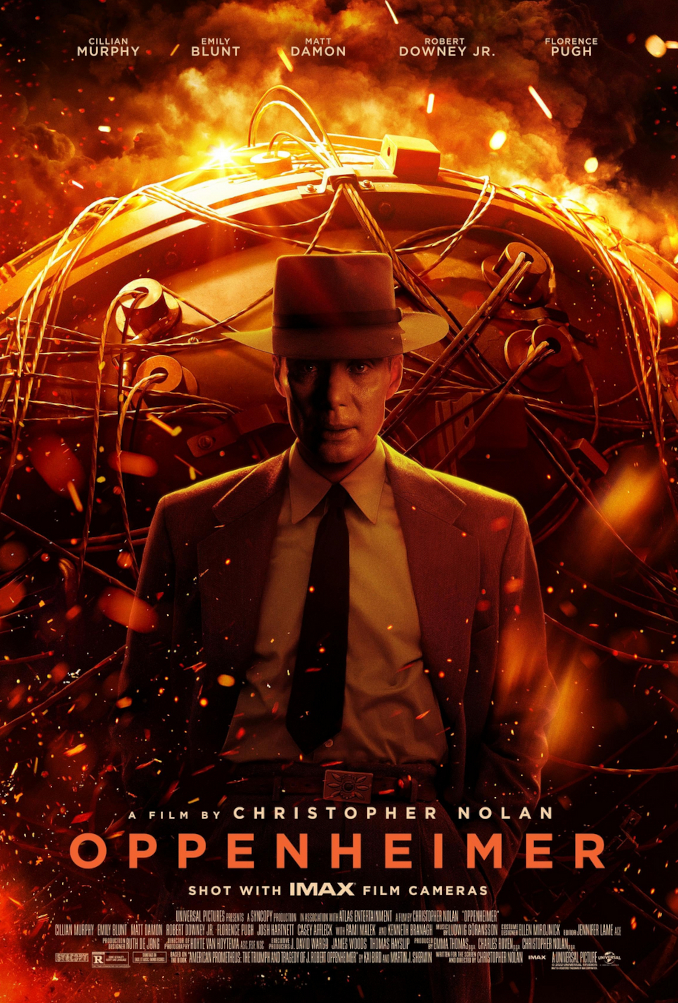Food for the Soul: Oppenheimer

Within one month of its global release, the movie Oppenheimer has grossed $700M in cumulative worldwide box office, making it more successful than Interstellar, the 2014 space movie by the same director, Christopher Nolan. The movie benefited from the social media trend of viewing both Oppenheimer and Barbie on the same day, and word of mouth made Oppenheimer a must-see of the season among young and older viewers alike. Marketing considerations aside though, the biographical tale of the creation of the first atom bomb has little to do with Barbie, but a lot to do with the director’s unique storytelling style, which places him in the category of the cinema auteurs of the last century, such as Stanley Kubrick, Federico Fellini, or artists of the French Nouvelle Vague. Nolan’s years of experimentation with narrative, timelines, and imagery—as expressed in the visuals of folding houses in Inception or the sequences of time reversal in Tenet—have now culminated in the way he tells the true and frightening story of the WWII arms race.
The biographical part of the movie is based on the 700-page book by Kai Bird and Martin J. Sherwin, entitled American Prometheus. It provides what the audience most expects—an account of the building of the first atom bomb by scientists involved in what was called the Manhattan Project. It chronicles Robert Oppenheimer’s challenges of finding, recruiting, and assembling groups of scientists and coordinating their research, which led to the first-ever explosion on July 16, 1945, the so-called Trinity Test in New Mexico that took place deep in the badlands of the American Southwest. The story also details a long vendetta plotted by Lewis Strauss, a scientist who felt that he had been slighted by Oppenheimer and who spent years building a case against his enemy. Being a scientist only exacerbated Strauss’s determination to take Oppenheimer down in a vein of a Salieri to his opponent’s Mozart. In 1953, Strauss’s actions instigated a security hearing that deprived Oppenheimer of his atomic security clearance and practically finished his academic career. The biography also addresses the scientist’s private life, which was rife with contradictions: his infidelities, his political naïveté, and his failures to navigate relationships within academia (faculty backbiting being part of the landscape at any university).
Oppenheimer’s biopic is also the audience’s conduit into the dramatic and ominous story of the development of the bomb and the arms race between American, German, and then Soviet scientists (after they managed to steal the info from Los Alamos). In that respect, the movie is in the same category as Imitation Game, the story of Alan Turing’s creation of the first proto-computer in response to the Enigma coding during WWII. In a way, both movies address the same tragic arc of a modern hero—a patriotic inventor whose work impacts countless lives is eventually destroyed by society over ideas that barely outlast the hero’s lifespan. In the case of Turing, his breaking of the Enigma secrets did not save him from being hounded for his homosexuality (he committed suicide in 1954); in the case of Oppenheimer, he was stripped of his political and scientific influence in 1954 during the anti-Communist witch hunt of the early ’50s.
Structurally, Nolan’s Oppenheimer really contains two movies in one. One is the biographical account of two decades of Oppenheimer’s life that included his pioneering interest in quantum physics (totally ignored in U.S. universities at the time), his leadership of the Los Alamos secret laboratory, and his post-war political drama. This movie is superbly told in images and dialogue.
However, there is a second movie that runs parallel to the linear narration. It offers insight into Oppenheimer’s inner life—his intellectual process when he studies quantum physics and its implications, his gradual understanding of the power of the bomb he is building, and his growing alarm at the consequences of the power that he is unleashing. This second movie is told mainly though sound—either the score (music by Ludwig Göransson) or sound effects, including Nolan’s use of the absence of sound just when we all expect it the most. For example, when the test bomb is detonated in the famed Trinity Test, we expect to hear a blast. Instead, we first get the absence of sound, until we indeed get hit with a blast that attacks our eyes and ears. If shaking theater seats were still in vogue, Nolan would probably have used them as well.
This parallel storytelling is also expressed by Nolanesque special effects of objects or even whole backgrounds vibrating, folding, or deforming outside the immobile protagonist. These are visual cues of a different reality, tools that Nolan invented and used in Inception, Interstellar, and Tenet. The two bands of storytelling run concurrently, to the point that when Oppenheimer and his colleagues argue about scientific solutions or, even more poignantly, about the consequences of the success of splitting the atom, the ominous music is almost louder than their dialogue. I heard some viewers complain that it was hard to hear the dialogue, but I think they missed the point—it is the music and sound effects that are important in those scenes, and not the exchange between characters where we can guess the gist of their discussion. The persistent sounds and intrusive music are the core of the story because they represent Oppenheimer’s inner dialogue with himself and his ever-present doubts and fears—reflections that made him advocate for nuclear arms control post-Hiroshima.
Oppenheimer died in 1967, amid the Cold War’s accelerated arms race. The world of today is as threatened by nuclear annihilation as it was back then, whether it be caused by an industrial accident or by warmongering men in power or those who lust after power. Nolan’s movie tries to remind people that the unleashing of nuclear demons cast a permanent shadow on human existence. The director’s alphabet of cinematic language is so vast and complex that he succeeds in making Oppenheimer almost a thriller rather than just a biopic suitable for school trips.
If Christopher Nolan ever makes a pure horror movie, I will be too scared to see it.
